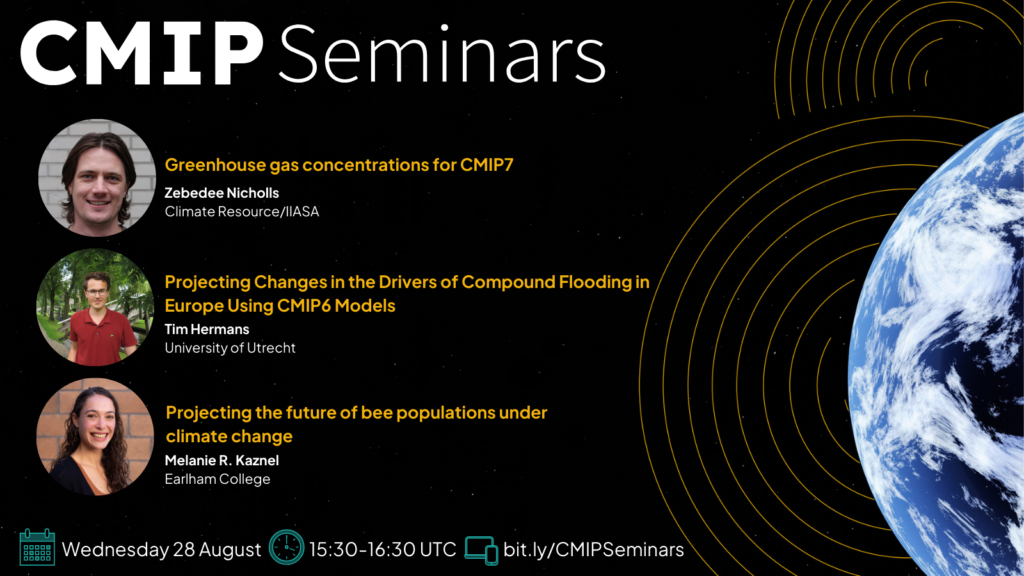
28 August, 2024 @ 15:30 – 16:30 UTC
Fifth session of the CMIP Seminar Series.

Registration
Click the button below to register. We’ll send out information on how to attend the seminars to this list a few hours before the event starts. Note that, if you registered for a previous event, you are already registered for all future events.
Speakers

Zebedee Nicholls Climate Resource, Modelling and Data Director; IIASA, Research Scholar
Title: Greenhouse gas concentrations for CMIP7
Abstract: Many CMIP models take greenhouse gas concentrations as one of their model inputs. Here we discuss how we derive (or are planning on deriving) the greenhouse gas concentrations for CMIP7’s DECK, specifically the historical simulation, and ScenarioMIP. The presentation will cover, at a very high level, the observational networks we rely on, the assimilation algorithm we use, the software we rely on and possible avenues for future research.

Tim Hermans Postdoctoral researcher, University of Utrecht
Title: Projecting Changes in the Drivers of Compound Flooding in Europe Using CMIP6 Models
Abstract: The co-occurrence or close succession of different flooding drivers like storm surges, rainfall and river discharge has the potential to affect coastal communities more severely than the separate occurrence of these drivers. Climate change could affect the probability that drivers of flooding coincide, potentially leading to larger flood risk in the future. However, projections of changes in the drivers of compound flooding in Europe so far have been based on small climate model ensembles because of the computational costs of using hydrodynamic models to derive changes in storm surges. To address this limitation, we used a data-driven storm surge model to compute projections for a large ensemble of CMIP6 simulations. To process this large set of CMIP6 data efficiently and reproducibly, we use the Analysis‐Ready Cloud Optimized CMIP6 data produced by the Pangeo/Earth System Grid Federation Cloud Data Working Group, held in public Google Cloud Storage. In this talk, Tim Hermans will present the CMIP6-based projections and discuss their sensitivity to ensemble size.

Melanie R. Kazenel Visiting Assistant Professor, Earlham College
Title: Projecting the future of bee populations under climate change
Abstract: Bees are important pollinators of many wild plants and agricultural crops, making it critical to understand how climate change could affect their population dynamics. We used 16 years of long-term bee monitoring data from New Mexico, USA in conjunction with local meteorological station data and projected future climate data from CMIP5 models to predict changes in regional bee abundance through the year 2100. Models forecasted abundance declines for 46% of bee species, projecting that future bee assemblages will be less diverse and dominated by drought-tolerant species. These shifts could have important consequences for the pollination of plants, as bee diversity typically maximises pollination at the community level. Our work highlights the threat posed by climate change to bee diversity, suggesting the importance of bee conservation efforts that account for climate-related stress.
Interested in speaking at a seminar? Let us know by clicking the button below.
